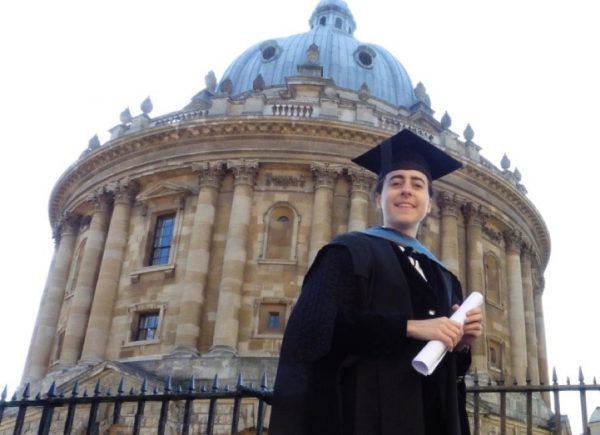Where do evolutionary biology, cancer research and music meet? In the unique Stefania Kapsetaki!
Stefania Kapsetaki, one of the «Kapsetaki twins», is a Biologist specializing in zoology. She studied Biology at the University of Crete. Afterwards, she continued her studies at the University of Oxford where she obtained both a Master’s and Doctorate in the field of Evolutionary Biology. Along with her career in science, she also excels in the field of music. Together with her twin sister, Marianna Kapsetaki, they have remarkable distinctions in their CV as piano soloists. Stefania spoke to Greek Women in STEM and we discussed a little bit of everything.
Would you like to talk a bit about the main areas of your research?
Of course! I am currently working on various areas of cancer research as a postdoctoral fellow. I mainly focus on the evolution and ecology point of view. We have, as a research team, data on the incidence of cancer that affects almost every species. Based on these data, we explore various factors that may explain the diversity of cancer in hundreds of animals on the tree of life. Some of these factors may be, for instance, the environment in which an animal lived during its evolutionary history, chimerism, and others.
What do we mean when we say chimerism?
Chimerism is used to describe the genetically different cells within us. Not germs or mutated cells of our own, but for example cells that were passed on to us from our mother, during embryonic development. One hypothesis is that these may be related to cancer.
Why did you decide to focus on Evolutionary Biology?
During my BSc, I was excited about many biology courses, especially ecology and evolution. We had to choose whether we wanted to specialize in either molecular biology and biotechnology or environmental biology. I chose the molecular courses, mainly because I wanted to start with the microcosm and later study the macrocosm. Towards the end of my studies, some courses in social evolution and major evolutionary transitions in individuality, such as the transition from single-celled to multicellular organisms, caught my attention, as they combined knowledge of evolution, ecology, and molecular biology.
And how did you combine Evolutionary Biology with the study of cancer?
I thought cancer had been studied mainly molecularly until then, and it would be wonderful if we could look at the phenomenon from an evolutionary and ecological point of view. A lecture by Lefteris Zouros, speaking about the perspective of cancer cells as selfish cells within a community of cooperative cells (the multicellular body), did the trick. This was the trigger to look further into what I would research in my master’s degree and where. So, I tried to find where they study the evolution of multicellularity from cancer’s point of view. And I found Stuart West’s team at the University of Oxford.
And there you stayed for a master’s and doctorate, what followed?
One of my thoughts after my PhD was to work with a research team in Cambridge studying transmissible cancers in dogs and Tasmanian devils. This collaboration led to another and then I found myself being interviewed for a postdoctoral fellowship at Arizona State University. There I found a team with which we had similar goals to study cancer, multicellularity, evolution, ecology, and other interesting topics, from a holistic perspective.
During your PhD, how was your daily life at one of the best universities in Europe?
Everyday life in Oxford was very interesting, exciting, and with many responsibilities and learning opportunities. I learned to go to the lab, to the office, take care of the algae and predators in the lab, attend seminars, rush to libraries with my bike, try to take care of myself on a daily basis, and present my research. All this was done until around 7 p.m. Then, I would visit the music department of the university to check whether there was a piano available for practice. Many times, all rooms where being used. I would then return quickly -in the rain- to my room and practice for as many hours as possible on the electric piano. Of course, not all days were like this. There were also the weekends, where sometimes the sun allowed us to walk in the wonderful parks and observe the beautiful vegetation and animals of the lakes and rivers.
How is your day now as a postdoctoral researcher in Arizona?
I am currently in Crete working remotely with Arizona State University. My daily life in Crete consists of morning, afternoon, evening, and sometimes midnight work, as due to the time difference most meetings and lectures in Arizona are nighttime in Greece. I work on many research projects, but also as a mentor helping students. I try to share what I learn.
You chose to build your career outside of Greece, would you like to tell us some of the reasons that led you to this decision?
Staying or leaving Greece has not always been a difficult decision for me. I consider the world like a continuum. Or maybe I hope so. Perhaps the fact that my mother is British and my father is Greek helps me see the world beyond borders. My decision to go to Oxford was mainly due to the fact that at the time I couldn’t find a research group that matched my interests in Greece. After my PhD, the passion for continuous development and search for new experiences and knowledge in multicellularity and cancer pushed me to follow the path leading to Arizona. And now with the pandemic, I am working remotely from Crete. Sometimes only when we lose something or leave it, we really appreciate it.
The fields of research and music require time and dedication, how do you manage to combine them? Especially during your PhD how did you organize your time?
This is a difficult question I often ask myself. When I find meaning in something, I find time for it. Music is scientific, and science is musical. I believe that the study of both can show us paths we did not know before. This is one of the main reasons I try to combine both. I usually study piano after my research work or more disorganized hours on weekends. Piano nights are like a retrospect of the day, meeting things we did not know. Meeting the composers and discussing with them each musical phrase. Like reading a new book. This is how I usually find out that, only by knowing new things we respect them. It is something that helps me find peace within the world, the microcosm and the macrocosm.

Follow Dr. Kapsetaki’s work:
linktr.ee
RELATED ARTICLES
CONTACT US
____________
greekwomeninstem@gmail.com
Do you have ideas, questions, comments or special requests?
Would you like to highlight your research project or nominate a researcher that you would like to learn more about?
Please write to our email or fill out the form and hit “send”. We will be happy to talk with you!
[contact-form-7 id=”44″ title=”Contact form 1″]
